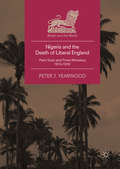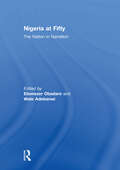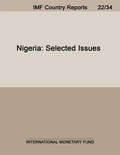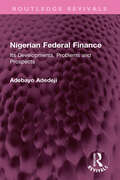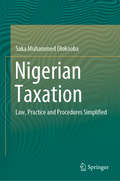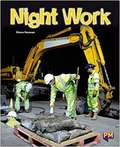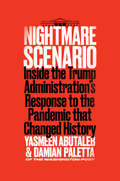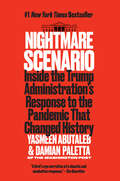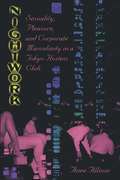- Table View
- List View
Niederlassungen führen
by Patrick S. Renz Nikola BöhrerNiederlassungen sollten ganzheitlich geführt und gesteuert werden - andernfalls leiden Strategieumsetzung und Kommunikation. Die ganzheitliche Steuerung ist deshalb eine Governance-Aufgabe, die nicht nur im Pflichtenheft des Boards steht, auch Management und Mitarbeiter müssen in ihrem Aufgabenbereich dazu beitragen. In dem Buch werden die sechs Bereiche ganzheitlicher Führung theoretisch und anhand zahlreicher Praxisbeispiele dargestellt und hinsichtlich des Markterfolgs und der Innovationsfähigkeit analysiert. Mit Checklisten für die Umsetzung.
Niederlassungen führen: Mit Subsidiary Governance zum Erfolg
by Nikola Böhrer Marc K. Peter Patrick RenzNiederlassungen sollten ganzheitlich geführt und gesteuert werden – andernfalls leiden Strategieumsetzung und Kommunikation. Die ganzheitliche Steuerung ist deshalb eine Governance-Aufgabe, die nicht nur im Pflichtenheft des Boards steht, auch Management und Mitarbeiter müssen in ihrem Aufgabenbereich dazu beitragen. In dem Buch werden die sechs Bereiche ganzheitlicher Führung theoretisch und anhand zahlreicher Praxisbeispiele dargestellt und hinsichtlich des Markterfolgs und der Innovationsfähigkeit analysiert. Mit Checklisten für die Umsetzung.
Niederlassungsbereitschaft angehender (Gesundheitsmanagement und Gesundheitsökonomik)
by Juliana MeyerSeit einigen Jahren lassen sich immer weniger Ärzte nieder. Gleichzeitig sehen sich viele Länder mit einem Ärztemangel konfrontiert. Dieser zeigt sich vor allem in dem Fachbereich der hausärztlichen Versorgung und in ländlichen Regionen und somit vor allem in Bereichen, in denen sich ein Großteil der Ärzte niederlässt. Dabei stellt sich die Frage, welche Rolle die Niederlassung als Berufsform hier spielt. In dem vorliegenden Buch wird die Niederlassungsbereitschaft angehender (Fach-)Ärzte in Deutschland und Dänemark untersucht. Hierfür wurden eine systematische Literaturrecherche, Interviews mit Medizinstudierenden, Ärzten in Weiterbildung und frisch niedergelassenen Ärzten sowie eine Umfrage unter Medizinstudierenden und Ärzten in Weiterbildung durchgeführt. Ziel ist es, die aktuelle Niederlassungsbereitschaft und Einflussfaktoren auf die Niederlassungsbereitschaft zu eruieren, um praktische Handlungsempfehlung zur Sicherstellung einer bedarfsgerechten Versorgung zu entwickeln.
Nietzsche and the Politics of Reaction: Essays on Liberalism, Socialism, and Aristocratic Radicalism (Palgrave Studies in Classical Liberalism)
by Matthew McManusThis book is intended as a major interdisciplinary contribution to the study of Nietzsche’s thought in particular, and the political right more generally. Historically the assessment of Nietzsche’s politics has ranged from denouncing him as a forerunner to Nazism to claiming he effectively did not have articulated political convictions. During the latter half of the 20th century he surprisingly became a major theoretical influence on a variety of post-structuralist radical critics, who saw in his perspectivism and genealogy of power useful tools to critique existent structures of domination. This collection of essays reframes the debate by looking at Nietzsche’s constructive political project defending aristocratic values from the levelling influence of the herd and its liberal, socialist, and democratic spokesmen. The essays will also explore how this defense of aristocratic values continues to have an influence on the political right, inspiring moderates like Jordan Peterson and far right authors and activists like Aleksandr Dugin and Steve Bannon.
Nigel Andrews and General Electric Plastics (A)
by Todd D. JickDescribes some critical challenges involved in creating employee empowerment. In the context of General Electric's efforts to debureaucratise the company, employees were encouraged to become more "self-confident". This effort, called "Workout," was introduced all over the company. At one plant site, GE Silicone, an empowered steering committee helped to organize and lead problem-solving teams. However, one team decision was in conflict with a management decision and created a conflict in authority. Can be used to identify some of the natural ambiguities and tensions related to empowerment.
Niger: Poverty Reduction Strategy Paper Progress Report
by International Monetary FundA report from the International Monetary Fund.
Niger: Statistical Annex
by International Monetary FundA report from the International Monetary Fund.
Nigeria and the Death of Liberal England: Palm Nuts and Prime Ministers, 1914-1916 (Britain and the World)
by Peter J. YearwoodThis book shows how a stormy parliamentary debate over the sale of German properties in Nigeria on 8 November 1916 began the process which brought down Asquith and made Lloyd George prime minister. The colonial secretary, Bonar Law, who was also leader of the Conservative Party, wanted neutral firms to bid. Usually presented as a policy imposed on him by doctrinaire Liberal free-traders, it was in fact that of the colonial government, which hoped that encouraging foreign competition would prevent the Nigerian export economy becoming controlled by a ring of mainly Liverpool firms. Seeing itself as the defender of Nigerian interests, the Colonial Office endorsed this. The large British companies got up an agitation, which was taken over by Sir Edward Carson, the one significant opposition politician, as part of his attack on supposed German influence in high places. Law counter-attacked by arguing that a supposedly patriotic cause masked the greed of an emergent cartel. He succeeded because smaller British and African firms, trying to break into the now profitable produce export trade, had already painted that picture. By defeating Carson in the debate, Law became again an effective party leader, who hoped to re-invigorate the coalition, but instead found himself working with Lloyd George to sideline Asquith. Based on underused sources, and overturning established interpretations, the book situates the debate within the context of the development of the Nigerian economy, the conflicts between the major firms, the role of oils and fats in wartime, and the emergence of Nigerian nationalism.
Nigeria at Fifty: The Nation in Narration
by Wale Adebanwi Ebenezer ObadareNigeria, Africa’s most populous and biggest democracy, celebrates her fiftieth year as an independent nation in October 2010. As the cliché states, ‘As Nigeria goes, so goes Africa’. This book frames the socio-historical and political trajectory of Nigeria while examining the many dimensions of the critical choices that she has made as an independent nation. How does the social composition of interest and power illuminate the actualities and narratives of the Nigerian crisis? How have the choices made by Nigerian leaders structured, and/or have been structured by, the character of the Nigerian state and state-society relations? In what ways is Nigeria’s mono-product, debt-ridden, dependent economy fed by ‘the politics of plunder’? And what are the implications of these questions for the structural relationships of production, reproduction and consumption?This book confronts these questions by making state-centric approaches to understanding African countries speak to relevant social theories that pluralize and complicate our understanding of the specific challenges of a prototypical postcolonial state.This book was published as a special issue of the Journal of Contemporary African Studies.
Nigeria: Selected Issues (Imf Staff Country Reports)
by International Monetary Fund. African Dept.A report from the International Monetary Fund.
Nigeria: Selected Issues (Imf Staff Country Reports)
by International Monetary Fund. African Dept.A report from the International Monetary Fund.
Nigeria: Selected Issues and Statistical Appendix
by International Monetary FundA report from the International Monetary Fund.
Nigerian Consumer Credit: Law, Regulation and Market Insights (Palgrave Macmillan Studies in Banking and Financial Institutions)
by Philemon Iko-Ojo OmedeThis book critically reviews transnational banking regulations that specifically impact consumer lending in Africa's largest economy. It provides a comprehensive analysis on the politics and economics of financial sector consolidation in an emerging market in West Africa, also covering law, consumer credit, and consumer policy along with a discussion of banking sector reforms heavily influenced by the neoliberal economics paradigm. There have been several developments since the publication of the existing books especially in the area of regulatory theory and social protection that are captured in this book, which will be of interest to researchers, students, and scholars of banking regulation, development economics, and international finance.
Nigerian Federal Finance: Its Developments, Problems and Prospects (Routledge Revivals)
by Adebayo AdedejiOriginally published in 1969, this was the first standard work on Nigerian federal finance ever published. It traces the evolution of federal finance in Nigeria during a 20-year period from 1946 and analyses the economic, socio-political and fiscal problems encountered by the governments of the Federation in the course of this development. It also examines the main features of the fiscal system which emerged and discusses the way in which the general principles of federal finance have had to be tailored to the particular needs and interests of the different regions in Nigeria.
Nigerian Taxation: Law, Practice and Procedures Simplified (SpringerBriefs in Law)
by Saka Muhammed OlokoobaThis book offers a simplified and straightforward introduction to the basics of Nigerian taxation. While discussing various laws, practices and procedures, it also addresses the latest amendments to Nigerian tax laws. The book begins by discussing the central issue of Islamic taxation and its legality under Nigerian law. Divided into four main sections, the book was designed for simplicity, and uses language that is accessible for all tax stakeholders.
Night Fire: Big Oil, Poison Air, and Margie Richard's Fight to Save Her Town
by Ronnie GreeneThe Diamond neighborhood was an all-black enclave in the mostly white town of Norco, Louisiana, aptly named for the New Orleans Refining Co., an industrial processing plant. Margie Eugene Richard was raised in the shadow of a giant chemical plant operated by Shell, and witnessed her neighbors fall ill amid the toxic waste the plant emitted year after year. Her own sister, Naomi, eventually succumbed to a rare lung disease linked to environmental hazards. Determined to see Shell take responsibility for its actions, Margie and her neighbors—largely poor and with few obvious resources—educated themselves not only on the consequences of environmental poison but also on how to fight back. The battle took them from Diamond's four streets all the way to The Hague and beyond. The unexpected results won Margie the prestigious Goldman Environmental Prize and helped clean up a community. With riveting narrative drive, Night Fire illustrates how determination and grit can move even the most stubborn of corporate giants.
Night Work (Into Reading, Level J #84)
by Diana NoonanNIMAC-sourced textbook <p><p> People who work at night-time, while everyone else is asleep, are called night workers. They do many sorts of important jobs.
Nightmare Scenario: Inside the Trump Administration's Response to the Pandemic That Changed History
by Yasmeen Abutaleb Damian PalettaFrom the Washington Post journalists Yasmeen Abutaleb and Damian Paletta—the definitive account of the Trump administration’s tragic mismanagement of the COVID-19 pandemic, and the chaos, incompetence, and craven politicization that has led to more than a half million American deaths and counting. <P><P> Since the day Donald Trump was elected, his critics warned that an unexpected crisis would test the former reality-television host—and they predicted that the president would prove unable to meet the moment. In 2020, that crisis came to pass, with the outcomes more devastating and consequential than anyone dared to imagine. Nightmare Scenario is the complete story of Donald Trump’s handling—and mishandling—of the COVID-19 catastrophe, during the period of January 2020 up to Election Day that year. <P><P> Yasmeen Abutaleb and Damian Paletta take us deep inside the White House, from the Situation Room to the Oval Office, to show how the members of the administration launched an all-out war against the health agencies, doctors, and scientific communities, all in their futile attempts to wish away the worst global pandemic in a century. From the initial discovery of this new coronavirus, President Trump refused to take responsibility, disputed the recommendations of his own pandemic task force, claimed the virus would “just disappear,” mocked advocates for safe-health practices, and encouraged his base and the entire GOP to ignore or rescind public health safety measures. <P><P> Abutaleb and Paletta reveal the numerous times officials tried to dissuade Trump from following his worst impulses as he defied recommendations from the experts and even members of his own administration. And they show how the petty backstabbing and rivalries among cabinet members, staff, and aides created a toxic environment of blame, sycophancy, and political pressure that did profound damage to the public health institutions that Americans needed the most during this time. Even after an outbreak in the fall that swept through the White House and infected Trump himself, he remained defiant in his approach to the virus, very likely costing him his own reelection. <P><P> Based on exhaustive reporting and hundreds of hours of interviews from inside the disaster zone at all levels of authority, Nightmare Scenario is a riveting account of how the United States government failed its people as never before, a tragedy whose devastating aftershocks will linger and be felt by generations to come. <P><P><b>A New York Times Best Seller</b>
Nightmare Scenario: Inside the Trump Administration's Response to the Pandemic That Changed History
by Yasmeen Abutaleb Damian PalettaInstant #1 New York Times and Wall Street Journal bestsellerFrom the Washington Post journalists Yasmeen Abutaleb and Damian Paletta—the definitive account of the Trump administration’s tragic mismanagement of the COVID-19 pandemic, and the chaos, incompetence, and craven politicization that has led to more than a half million American deaths and counting.Since the day Donald Trump was elected, his critics warned that an unexpected crisis would test the former reality-television host—and they predicted that the president would prove unable to meet the moment. In 2020, that crisis came to pass, with the outcomes more devastating and consequential than anyone dared to imagine. Nightmare Scenario is the complete story of Donald Trump’s handling—and mishandling—of the COVID-19 catastrophe, during the period of January 2020 up to Election Day that year. Yasmeen Abutaleb and Damian Paletta take us deep inside the White House, from the Situation Room to the Oval Office, to show how the members of the administration launched an all-out war against the health agencies, doctors, and scientific communities, all in their futile attempts to wish away the worst global pandemic in a century. From the initial discovery of this new coronavirus, President Trump refused to take responsibility, disputed the recommendations of his own pandemic task force, claimed the virus would “just disappear,” mocked advocates for safe-health practices, and encouraged his base and the entire GOP to ignore or rescind public health safety measures. Abutaleb and Paletta reveal the numerous times officials tried to dissuade Trump from following his worst impulses as he defied recommendations from the experts and even members of his own administration. And they show how the petty backstabbing and rivalries among cabinet members, staff, and aides created a toxic environment of blame, sycophancy, and political pressure that did profound damage to the public health institutions that Americans needed the most during this time. Even after an outbreak in the fall that swept through the White House and infected Trump himself, he remained defiant in his approach to the virus, very likely costing him his own reelection.Based on exhaustive reporting and hundreds of hours of interviews from inside the disaster zone at all levels of authority, Nightmare Scenario is a riveting account of how the United States government failed its people as never before, a tragedy whose devastating aftershocks will linger and be felt by generations to come.
Nightwork: Sexuality, Pleasure, and Corporate Masculinity in a Tokyo Hostess Club
by Anne AllisonIn Nightwork, Anne Allison opens a window onto Japanese corporate culture and gender identities. Allison performed the ritualized tasks of a hostess in one of Tokyo's many "hostess clubs": pouring drinks, lighting cigarettes, and making flattering or titillating conversation with the businessmen who came there on company expense accounts. Her book critically examines how such establishments create bonds among white-collar men and forge a masculine identity that suits the needs of their corporations. Allison describes in detail a typical company outing to such a club—what the men do, how they interact with the hostesses, the role the hostess is expected to play, and the extent to which all of this involves "play" rather than "work. " Unlike previous books on Japanese nightlife, Allison's ethnography of one specific hostess club (here referred to as Bijo) views the general phenomenon from the eyes of a woman, hostess, and feminist anthropologist. Observing that clubs like Bijo further a kind of masculinity dependent on the gestures and labors of women, Allison seeks to uncover connections between such behavior and other social, economic, sexual, and gendered relations. She argues that Japanese corporate nightlife enables and institutionalizes a particular form of ritualized male dominance: in paying for this entertainment, Japanese corporations not only give their male workers a self-image as phallic man, but also develop relationships to work that are unconditional and unbreakable. This is a book that will appeal to anyone interested in gender roles or in contemporary Japanese society.
Nike (A) (Condensed)
by David B. YoffieDescribes the history of Nike, its strategy, and the industry in which it competes. The teaching objective is to ask the student to identify and evaluate Nike's economic/technical strategy.





